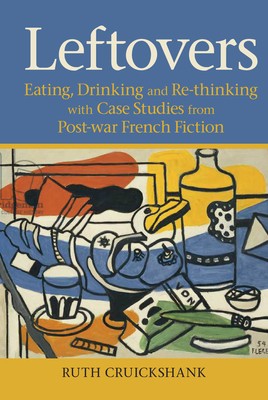
- We will send in 10–14 business days.
- Author: Ruth Cruickshank
- Publisher: Liverpool University Press
- ISBN-10: 1789620678
- ISBN-13: 9781789620672
- Format: 15.5 x 23.4 x 2 cm, hardcover
- Language: English
- SAVE -10% with code: EXTRA
Reviews
Description
Eating and drinking are essential to survival. Yet for human animals, they are intrinsically ambivalent, proliferating with ideological, historical and psychological leftovers. This study reveals and mobilizes the provisional meanings, repressed experiences and unacknowledged tensions bound up with representations of
food, drink and their consumption. It creates a flexible critical framework by bringing together an unexploited convergence of post-war French thinkers who use - or whose thought is legible through - figures of eating and drinking, including Barthes, Bataille, Beauvoir, Bourdieu, Certeau, Cixous, Derrida, Fischler, Giard, Kristeva, Lacan, Lefebvre, Lévi-Strauss, Mayol and Sartre.
meanings bound up with linguistic traces; economies of excess; everyday 'making-do'; the ethics of consuming the other; the return of the repressed; lack; abjection; and notions of 'eating on the sly', 'mother's milk', the
'omnivore's paradox' and 'gastro-anomie'. The vast possibilities for re-thinking with eating and drinking are further exemplified in cases studies of novels in which - often beyond authorial intentions - food and drink are structurally important and interpretatively
plural. These are Robbe-Grillet's Les Gommes/The Erasers (1953); Ernaux's Les Armoires vides/Cleaned Out (1974); Darrieussecq's Truismes/Pig Tales (1996); and Houellebecq's La Carte et le territoire/The Map and the Territory (2010). New understandings of post-war French cultural production are revealed in these case studies. But above all, the analyses demonstrate the potential for literary, comparative, cultural, film, gender and food studies of re-thinking with eating and drinking across genres, periods and places.
EXTRA 10 % discount with code: EXTRA
The promotion ends in 17d.21:47:29
The discount code is valid when purchasing from 10 €. Discounts do not stack.
- Author: Ruth Cruickshank
- Publisher: Liverpool University Press
- ISBN-10: 1789620678
- ISBN-13: 9781789620672
- Format: 15.5 x 23.4 x 2 cm, hardcover
- Language: English English
Eating and drinking are essential to survival. Yet for human animals, they are intrinsically ambivalent, proliferating with ideological, historical and psychological leftovers. This study reveals and mobilizes the provisional meanings, repressed experiences and unacknowledged tensions bound up with representations of
food, drink and their consumption. It creates a flexible critical framework by bringing together an unexploited convergence of post-war French thinkers who use - or whose thought is legible through - figures of eating and drinking, including Barthes, Bataille, Beauvoir, Bourdieu, Certeau, Cixous, Derrida, Fischler, Giard, Kristeva, Lacan, Lefebvre, Lévi-Strauss, Mayol and Sartre.
meanings bound up with linguistic traces; economies of excess; everyday 'making-do'; the ethics of consuming the other; the return of the repressed; lack; abjection; and notions of 'eating on the sly', 'mother's milk', the
'omnivore's paradox' and 'gastro-anomie'. The vast possibilities for re-thinking with eating and drinking are further exemplified in cases studies of novels in which - often beyond authorial intentions - food and drink are structurally important and interpretatively
plural. These are Robbe-Grillet's Les Gommes/The Erasers (1953); Ernaux's Les Armoires vides/Cleaned Out (1974); Darrieussecq's Truismes/Pig Tales (1996); and Houellebecq's La Carte et le territoire/The Map and the Territory (2010). New understandings of post-war French cultural production are revealed in these case studies. But above all, the analyses demonstrate the potential for literary, comparative, cultural, film, gender and food studies of re-thinking with eating and drinking across genres, periods and places.


Reviews